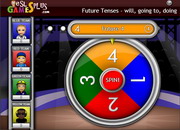Here you have some activities to practise your English during the summer.
THE PASSIVE (PRESENT SIMPLE AND PAST SIMPLE)
Watch these videos and online games to learn more about the passive sentences.
PRESENT PERFECT
Click on the following links and enjoy some games and activities about present perfect.
We can use wish + past simple to talk about a present situation we would like to be different.
Structure:
I + wish + I + could buy a new computer
I wish you were here.
I wish you lived in Madrid.
He wishes he could buy a new car.
This video will help you to understand it:
And now, let's listen to a song. Do you recognise the structure 😉?
*Compact Preliminary for schools:
Let's do a reported speech review (page 61, Part 1. Ex.1 and exam task)
- "Exam task" exercise: this exercise is the opposite: you have to
write the direct form from a reported statement – este ejercicio es al revés de
los que hemos hecho hasta ahora. La frase está en reported speech y lo tenemos
que poner en estilo directo-. Un ejemplo:
The teacher told us not to put plastic bottles in the green
bin →
“Please do not put plastic bottles in the green bin” the teacher said.
18th May
Reported speech:
Oh my goodness? "Reported speech"? What is that 😖? Do you remember when you studied it last year? Don't worry, after reading this post and watching these videos you'll be an expert 😀.
We use Reported speech (estilo indirecto) to tell someone what another person said.This video will help you to understand it:
| direct statement | reported statement |
|---|---|
| "I am sick." | She said that she was sick. |
Let's imagine something: you are with two friends (Mario and Daniella) and Mario says: "I love Harry Potter films". Daniella didn't hear him, so she asked you: "What did he said?" And you say:
"He said he loved Harry Potter films".
So, in this example:
Direct speech: 'I love Harry Potter films,' he said.
Reported speech: He said he loved Harry Potter films.
Have you noticed there has been some changes? When we change direct speech into reported speech, we need to change the tense:
- present simple ⇒ past simple
- present continuous ⇒ past continuous
- past simple ⇒ past perfect
- present perfect ⇒ past perfect
- future simple ⇒ would + verb
Don't panic!!! It's easier than you think, trust me:
And finally... let's visit the following website. You'll find a video and some exercises for practising.
If you have any question, please contact me or leave a comment below.
Gema
12th May
Reflexive pronouns:
Do you remember reflexive pronouns? Reflexive pronouns are: myself, yourself, himself, herself, itself, ourselves, yourselves and themselves. They refer back to a person or thing.
Reflexive pronouns are used when the subject and the object of the action are the same person, animal or thing.
Some examples:
⏭ I cut myself by accident.
⏭ You need to believe in yourself.
⏭ He is teaching himself to play the guitar.
⏭ They walk to school by themselves.
- Here you'll find a short explanation:
- And a song:
Gema
4th May
How to do the worksheet (live worksheet):
1. Go to
2. Complete the worksheet.
3. Click on "terminado"
4. Click on "enviar respuestas a mi profesor" (send answers to my teacher).
5. Write your name, subject (English) and grade (6th). And enter the code:
lgevpvy27r (teacher code)
6. Click on "enviar".
7. And finally, you've finished!!!
22nd April
Modal verbs
First, let's present the topic:
- Have to/ don't have to
- You have to tidy your room (it's compulsory, you have to do it). For example we can use it when writing rules.
- You don't have to get up early on Saturdays (you can do it, but it's not compulsory.There is no obligation).
- Should/Shouldn't, ought to/ ought not to
If you have any question, leave your comments below.
Gema
14th April
How to do the quiz:
1.
Go to joinmyquiz.com
3.
Click on "únete"
4. Enter your name… and start!
Gema
20th March
Answer CDI (English).
You can download the solutions. Click below:
ANSWER KEY (CDI)
Was it difficult? Did you find it easier or more difficult than Cambridge tests?
13th March
CDI (English)
You can download the file (click on the link below):
"Competencia en comunicación lingüística 2018".
And this is the audio (click on the link below):
Audio
I'll post the solutions by the end of the week. Have a nice week!!
Gema
PRESENT PERFECT CONTINUOUS IN DAILY LIFE
Let's enjoy listening to a song at the same time we're learning grammar!!
* REPORTED SPEECH
- REPORTED QUESTIONS EX.1
- REPORTED QUESTIONS EX.2
- REPORTED REQUESTS
EXERCISE ON REPORTED SPEECH

_________________________________
*THE PASSIVE
- ACTIVE OR PASSIVE? PRESENT SIMPLE
- THE PASSIVE PRESENT SIMPLE
- ACTIVE OR PASSIVE? PAST SIMPLE
- THE PASSIVE PAST SIMPLE
- THE PASSIVE PRESENT CONTINUOUS
______________________________
*PRESENT PERFECT
_________________________________
*FUTURE "WILL"
_________________________________
*FUTURE "BE GOING TO"
______________________________
* FUTURE TENSES GAME
Practice "be going to"; "will"; "present continuous"
____________________________
* CONDITIONALS
__________________________________
* PRESENT SIMPLE
___________________________
*PRESENT CONTINUOUS
___________________________
*PRESENT SIMPLE VS PRESENT CONTINOUS
EXERCISE 1
__________________________________
* IRREGULAR PAST SIMPLE GAME
______________________________________________
* PRESENT CONTINUOUS RALLY GAME

_______________________________________________
* PAST SIMPLE VS PAST CONTINUOUS



Hello Gemma, thanks for all the the links you have placed, they are very useful and fun, they are helping me a lot to understand each topic better.
ResponderEliminarHi Ana,
ResponderEliminarHow are you? I'm glad you like them! Thanks for your feedback ;)
Gema
Hi Gema the videos were very good and explained very well
ResponderEliminarThanks for your comment, Iker!!
ResponderEliminar